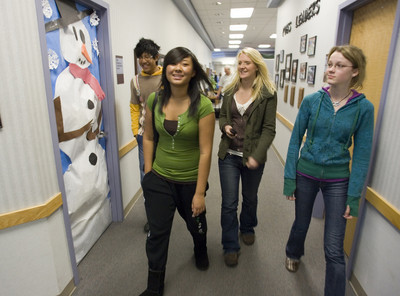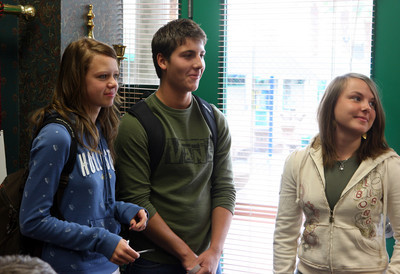Life, American Style
What is America?
It's a land of big cars, big TVs and big soft drinks. A land of multiple choice tests and shorter school days.
And, it's a land of friendly -- if sometimes geographically clueless -- people.
Call it a verbal sketch of Las Vegas created by a few teenagers who aren't from here but are learning firsthand what American life is about.
Our artists: exchange students who are spending the school year at Green Valley and Palo Verde high schools.
They came here, all agree, for the experience of living in another country. Learning English is another significant motivation.
Back home, "when I was in English class, I never talked in English. Never," notes Alicja Kozlowska, 16, of Hamburg, Germany, who is attending Green Valley High School.
"You need it for work nowadays," notes Palo Verde student Caroline Lagerholm, 18, from Stockholm, Sweden. "In Sweden, most companies nowadays are internationals, and you have to be able to speak the language."
HERE AND THERE
For most of the students, it's their first experience in the United States. But Marion Strunck, 16, who lives near Braunschweig, Germany, visited the United States in 2005 during a family vacation before her stint at Palo Verde High School. They visited Las Vegas, but Marion admits she saw the city then like most tourists do.
"If you go on vacation here, you look around and then you see those casinos and everything you don't have in Germany," she says. "But when you live here, it's more like you hop into the life of everyone."
Caroline has visited friends in Minnesota, but hadn't been to Las Vegas. "I knew about Americans," she says, "but I knew nothing about Las Vegas. Because Vegas is so different compared to other cities in the U.S., too."
When they applied to the exchange programs that are sponsoring them here, most had a chance to pick, at best, a region of the country in which to live. Hans Georg Jaklitsch, 16, of Murau, Austria, remembers looking at brochures and seeing "like, exchange students on the beach."
He didn't find a beach at Green Valley High, and admits he didn't know much about Las Vegas. "You see the slot machines and everything," he says, "but it's like a normal town here."
"My dad was pretty worried when he heard I was going to Las Vegas," admits Nanxi Wang, 16, of Paderborn, Germany. "He was thinking I was going to live next to a casino."
Nele Schmidt, 17, of Hamburg, Germany, who's attending Green Valley, knew better. She has relatives here and first visited Las Vegas when she was 6. She arranged to spend her exchange experience living with them.
Among the students' first impressions of America in general and Las Vegas in particular is the sheer size of it all.
"If you go to a fast food restaurant (back home), it's like this," Caroline says, holding her hand a few inches from the table. "Here, if I order a medium soda, it's like this," she says, moving her hand a few inches higher.
"And the TV is like, oomph," Marion adds, holding her hands wide apart. "And the cars."
But just as big, they say, has been the hospitality of the Americans they've met.
"I love the U.S. I love it. The people are just so open-minded," Caroline says.
"If you go into a store, it's 'Hi, how are you? How can I help you?' In Sweden, it's like you're afraid to go in some stores. Like if you go into an expensive store in Sweden, they look at you like, 'What are you doing here? You're not our target to be in the store.' "
The students even are nice enough to consider it a sign of interest, and not mere stupidity, when Americans ask them dumb -- even astonishingly dumb -- questions.
Once, when Nanxi, who's attending Palo Verde, told a group of people where she's from, "they're, like, 'So, can you speak German?' Uh, yeah. I can."
One of Caroline's exchange student friends was asked: " 'Do you have a language in Sweden?' No. We sign."
And, there was the time when a student told her: "Oh, so you're from Sweden. You're the guys who make the watches.' We're like, 'No, that's Switzerland.' "
SCHOOL STUFF
One significant adjustment to American life centers around the students' school day. "Here, you take individual classes," Caroline explains. "But in Sweden, we choose a program. Like, I have international academy."
It's the same in Austria, Georg says, adding that he'll spend his entire school day with the same group of students. Same in Germany, Alicja adds.
That arrangement enables a student to get to know his or her classmates better. Here, Georg says, "it's like you don't really talk to people. You're all together (there) with the same people. Here you change, and you don't really get to know your classmates."
On the upside, Nele notes, here, "it's like you know more people, because you're in different classes."
Schools are larger here, adds Nele, who estimates her school has about 800 students in eight grades. Georg notes that classes are smaller back home, too: With him away this year, his own class has about 13 people.
Marion says her school offers a more limited menu of classes for students to take. "Here, there are much more subjects to take, like business or journalism and fashion, and we don't have that," she says.
The timing of the school day is more varied. Georg says his classes begin at 8 a.m. on some days and 10 a.m. on others.
In contrast, Zhengwen Sun, 15, of China who is attending Palo Verde, starts school at 7 a.m. and isn't finished until 6:30 p.m. That elicits disbelieving gasps from Palo Verde classmates Marion, Caroline and Nanxi.
Homework is uncommon for Swedish students, Caroline says. "Here, we have homework every day. There, we have it like once a week."
One thing the students love about American high school: multiple choice tests. Nanxi says she doesn't have them back home, and Caroline says that, while she'll go five or six weeks between exams versus every two weeks or so here, exams there are heavy on essays and answering questions.
In fact, Nanxi admits, "I'm kind of scared to go back."
When they're not at school, the students spend their free time pretty much the way they spend it back home: hanging out with their friends; playing on, or hoping to join, sports teams (basketball for Zhengwen, soccer for Georg, track for Alicja); and participating in extracurricular activities (Nele was in marching band and plans to join pep band).
Zhengwen says he often meets friends on weekends for theater outings or other activities back home. In Sweden, where the drinking age is 18, Caroline can go clubbing. A popular weekend activity back home goes by the name "fika," she adds, what we'd call "going out for coffee" -- meeting friends for conversation over coffee, tea or juice.
(AWAY FROM) HOME FOR THE HOLIDAYS
A few of the students admit to having battled an occasional bout of homesickness. "The first week of school was pretty tough," Nanxi says.
"I had like two really bad weeks," when she started hearing about what was changing among her family and friends back home, Alicja says.
"Just a little bit," Zhengwen concedes. "Now, everything's better."
But, with the holiday season arriving, might thoughts of family and friends thousands of miles away be a bit more present? "Yeah," Marion admits, drawing out the single syllable sadly.
Nele expects the yuletide homesickness to arrive "when I don't have to do anything. Then I think about my family and friends."
Nanxi was surprised that Christmas begins so early here. Marion says Germans begin celebrating Christmas on the night of Dec. 24. Nanxi says that, back home in Germany, "all the Chinese people just join together. So it's not really like a German Christmas."
There is some celebration of Christmas in China, Zhengwen says, "it's just take some trees and have some lights and have dinner."
One difference Caroline has noticed is that "we don't have lights on the house. Only on the trees."
Weirdest of all, Marion adds: "There's plastic trees here."
SOUVENIRS
On the students' before-school-ends to-do lists is seeing as much of America as they can before heading home.
Caroline already has been to California twice, and she's also been to Philadelphia. Nanxi wants to go to New York and "just travel around."
Zhengwen's itinerary is a bit more ambitious, considering that the school year's already half over. "Maybe," he says, "travel all over America."
And when they do return home, they'll return with, perhaps, and for good or bad, a few Americanized habits.
Nanxi, for instance, has found it odd about how ice is put into just about every imaginable drink in America. "Even in winter, you have ice in the cups," she says, laughing, and "even if you're cold, you drink ice water."
"Now, I really got used to it," she adds. "I think when I go back, I'm going to put ice in my cups, too."
And, Nanxi says, "I love Mexican food, and we don't have Mexican food."
Caroline, meanwhile, will miss plain old peanut butter.
"We don't have peanut butter in Sweden," she says. "We have, like, Skippy -- is that the name? But it's so expensive and not all of the stores have it. And I love peanut butter."
Zhengwen is a bit more general in what he'll miss. "Dessert," he simply says, smiling.
Nele will miss Southern Nevada's weather. "It can get humid back home," she says.
Georg, meanwhile, figures he'll miss "everything.
"I like all the things you can do here," he says, smiling. "I'm from a small town.
Contact reporter John Przybys at jprzybys@reviewjournal.com or (702) 383-0280.
VISITING STUDENTS
• Hans Georg Jaklitsch, 16, Murau, Austria (Green Valley High School)
• Alicja Kozlowska, 16, Hamburg, Germany (Green Valley High School)
• Caroline Lagerholm, 18, Stockholm, Sweden (Palo Verde High School)
• Nele Schmidt, 17, Hamburg, Germany (Green Valley High School)
• Marion Strunck, 16, Braunschweig, Germany (Palo Verde High School)
• Nanxi Wang, 16, Paderborn, Germany (Palo Verde High School)
• Zhengwen Sun, 15, China (Palo Verde High School)


















